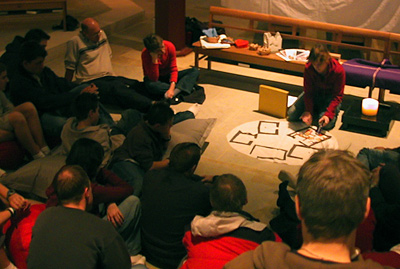John Hegarty on Truth and Risk
Just got back from hearing the legendary John Hegarty speak at the ad agency BBH (went with that other legend Steve Collins). Thanks to Graham Fink and The Arts School
John Hegarty, we were assured, was slightly delayed because he had just flown in from Miami - which of course is reason for admiration rather than disapointment. Hegarty in partnership with (Nigel Bogle & John Bartle) set up BBH in 1982. The agency has been responsible for some of the best known campaigns including famous Levi ads.
I think some of the points he makes are relevant in all sorts of fields where communication is important, not just advertising. Here are my notes from John Hegarty's talk given to a group of (mainly) students.
_____________________
The power of the truth
The greatest thing you can do in advertising is tell the truth, how you tell the truth, how you make it interesting, is the key. The truth lies in the product and what you have to do is dig it out.
The power of strategy
It would have been no good coming up with wonderful ideas if they were on a strategy that people didn't relate to. Linking those two things together has always been behind the success of BBH. You can't put up a wonderful new building without a great foundation.
The power of fame
We don't mean celebrity. The dictionary defines it as something of public renown or great esteem. We are living in a cluttered media driven world. Analysing who you should take notice of is just quicker if you are dealing with famous people of things.
The power of irreverence
Art went on the be something which debunked established order and forced people to ask questions. It was this irreverence which created tremendous power. Art made people think and we in advertising are constantly trying to make people think.
The power of humour
Humour binds people together. It can make difficult message acceptable to a broad range of people. Humour makes you listen. The trick is to make that humour relevent to the brand and that's where people often go wrong.
The last thing you want to be in advertising is in advertising.
People in advertising spend their lives looking at other bits of advertising. In a way I try my best not to look at other bits of advertising, I try to go out and look at life - try to stay connected in some shape or form. The thing you've got to do more than anything is keep an open mind. When you stop being excited by new things you become tired and stop being creative. You may work in advertising but don't live in advertising.
_____________________
Two themes pushed forward for me, truth and risk-taking. Here's a poem that was read out on the theme of risk.
To laugh is to risk appearing the fool.
To weep is to risk appearing sentimental.
To reach out for another is to risk involvement.
To expose feeling is to risk exposing your true self.
To place your ideas, your dreams before the crowd, is to risk their loss.
To love is to risk not being loved in return.
To live is to risk dying.
To hope is to risk despair.
To try is to risk failure.
But the risk must be taken, because the greatest hazard in life is to risk nothing.
The person who risks nothing, does nothing, has nothing and is nothing.
He may avoid suffering and sorrow, but he simply cannot learn, feel, change, grow, love, live.
Chained by his certitudes, he is a slave, he has forfeited freedom.
ONLY A PERSON WHO RISKS – IS FREE
(anon)
PS Source of poem not clear, but please find this reference: A handwritten copy was found in the car of Bagdhad CNN employee and blogger Duraid Isa Mohammed after the car came under attack and he and fellow CNN employee Yasser Khatab were killed.





